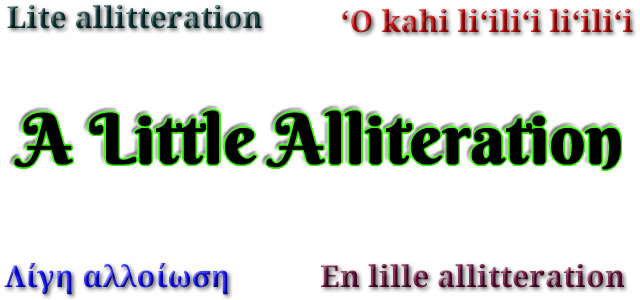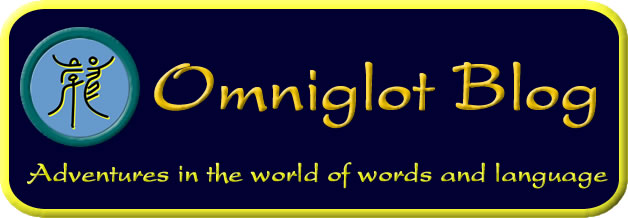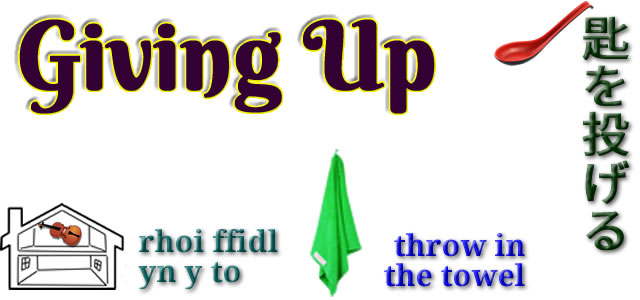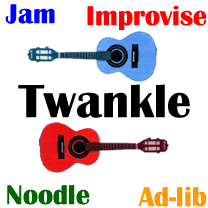I like a little alliteration, don’t you?

Alliteration is “The repetition of consonant sounds at the beginning of two or more words immediately succeeding each other, or at short intervals.” [source]. As in the sentence above. It comes from Modern/New Latin alliterationem, from alliterare (to begin with the same letter), from Latin ad (to, near) and lītera (letter, script) [source].
Other names for this include consonance (the repetition of consonants sounds) [source] and head rhyme. If similar or indentical vowel sounds are being repeated, as in “How now, brown cow?”, it’s called assonance [source] or slant rhyme.
Other kinds of rhymes include:
- syllabic rhyme: the last syllable of each word sounds the same but does not necessarily contain stressed vowels. E.g. cleaver, silver; pitter, patter.
- imperfect (or near) rhyme: a rhyme between a stressed and an unstressed syllable. E.g. wing, caring
- weak (or unaccented) rhyme: a rhyme between two sets of one or more unstressed syllables. E.g. hammer, carpenter
- semirhyme: a rhyme with an extra syllable on one word. E.g. bend, ending
- forced (or oblique) rhyme: a rhyme with an imperfect match in sound. E.g. green and fiend; one, thumb)
- pararhyme: all consonants match. E.g. tick, tock; bing, bong
Other types of rhyme, and other ways of classifying rhymes are available [More details].
I use a variety of rhymes in the songs I write. For example, my latest song was inspired by a phrase from the Irish course in Duolingo “Léann na lachan na nuachtán.” (The ducks read the newspaper). I made a more alliterative version: “Tá lacha ag léamh leabhar sa leabhrlann le leon agus luch.” (A duck is reading a book in the library with a lion and a mouse). The English version is only slightly alliterative, and that’s what often happens with translations, and why songs and poems are difficult to translate.
Here are the words of the song. Parts are quite alliterative, in Irish at least.
Eachtraí na Lacha (The Duck’s Adventures)
Tá an lacha ag léamh sa leabharlann
The duck is reading in the library
Tá an lacha ag léamh sa leabharlann
le leon agus luch (with a lion and a mouse)
Tá an lacha ag siúl go Sligeach
The duck is walking to Sligo
Tá an lacha ag siúl go Sligeach
ag lorg lámhainní (looking for gloves)
Tá an lacha ag canadh amhrán
The duck is singing a song
Tá an lacha ag canadh amhrán
faoi sionach an-sionnachúil (about a very cunning fox)
Tá an lacha ag labhairt Laidin
The duck is speaking Latin
Tá an lacha ag labhairt Laidin
lena lucht leanúna (with its supporters)
Tá an lacha ina coladh ina leabaidh
The duck is sleeping in its bed
Tá an lacha ina coladh ina leabaidh
Agus sin deireadh an scéil
And that’s the end of the tale
Agus sin deireadh an scéil
Here’s a rough recording:
I’ve been thinking of making it trilingual in Irish, English and Welsh, but haven’t got round to it yet.
Here’s an alliterative phrase I came up with that seems to translate well into a variety of languages:
- English: Singers sing songs
- Albanian: Këngëtarët këndojnë këngë
- Armenian: Երգիչները երգեր են երգում (Yergich’nery yerger yen yergum)
- Aymara: Q’uchunakax q’uchunak q’uchupxi
- Bengali: গায়কেরা গান গায় (Gāẏakērā gāna gāẏa)
- Bulgarian: Певците пеят песни (Pevtsite peyat pesni)
- Catalan: Els cantants canten cançons
- Corsican: I cantanti cantanu canti
- Croatian: Pjevači pjevaju pjesme
- Danish: Sangere synger sange
- Dhivehi (Maldivian): (lavakiyuntherin lavakiyaeve) ލަވަކިޔުންތެރިން ލަވަކިޔައެވެ
- Esperanto: Kantistoj kantas kantojn
- Estonian: Lauljad laulavad laule
- Finnish: Laulajat laulavat lauluja
- French: Les chanteurs chantent des chansons
- Galician: Os cantantes cantan cancións
- Greek: Οι τραγουδιστές τραγουδούν τραγούδια (Oi tragoudistés tragoudoún tragoúdia)
- Haitian Creole: Chantè chante chante
- Hindi: गायक गीत गाते हैं (gaayak geet gaate hain)
- Lingala: Bayembi bayembaka banzembo
- Mongolian: Дуучид дуу дуулдаг (Duuchid duu duuldag)
- Romanian: Cântăreții cântă cântece
- Russian: Певцы поют песни (Pevtsy poyut pesni)
- Swedish: Sångare sjunger sånger
- Turkish: Şarkıcılar şarkılar söylüyor
- Welsh: Cantorion yn canu caneuon
Translations by Google Translate. More are available
It’s unusual to find a phrase like this that has alliterative translations into so many different languages.
Are there other kinds of rhymes that you like / use / know?














